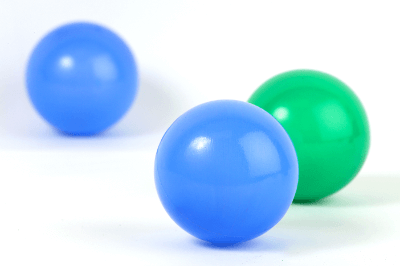What Is a Resin Ball?

A resin ball is a generic term for a spherical object made of polymer compounds, such as polyurethane, polyester, or acrylic.
They are used in a wide range of applications, from everyday objects to essential parts of medical and industrial machinery. Resin balls vary in size, ranging from a few millimeters to several centimeters in diameter, depending on the specific application.
There are numerous types of resin balls, manufactured using a wide variety of materials, and designed to meet various purposes and applications, each tailored to the characteristics of the respective plastic material.
Uses of Resin Balls
Due to their high transparency, acrylic resin balls find applications in everyday objects such as decorations, ball lenses, toys, and game consoles. In medical and industrial equipment, they serve as crucial components, acting as bearings for rotating and reciprocating mechanical parts, referred to as bearings. They are also used in valves, including safety valves and check valves, within liquid and gas piping systems.
Resin balls prove exceptionally effective in specialized environments, such as medical equipment where electricity or magnetic force should not be applied, where metal parts are unsuitable, or in the presence of chemicals (acids, alkalis, organic solvents, etc.), thanks to their insulation and abrasion resistance properties.
Principle of Resin Ball
Resin balls can be broadly categorized into thermosetting resin and thermoplastic resin, each of which is manufactured differently.
1. Thermosetting Resin
Thermosetting resins, such as phenol, epoxy, and unsaturated polyester, are liquid resins that cure when subjected to heat during the molding process. They are characterized by their hardness, insulation, resistance to voltage and heat, and resistance to solvents.
2. Thermoplastic Resin
Thermoplastic resins, such as polyethylene, polyvinyl chloride, polyurethane, and acrylic, soften when they reach their glass transition temperature or melting point. These resins become pliable when heated and then solidify during cooling, forming the molding process.
Unlike thermosetting resins, thermoplastic resins can be recycled because they soften when heated and can be molded repeatedly. All Resin balls exhibit superior insulation, corrosion resistance, and chemical resistance compared to metals, making them environmentally friendly as they do not leach out harmful substances like lead over time.
Types of Resin Balls
1. Polypropylene (PP) Balls
Polypropylene is a plastic known for its excellent heat, chemical, and abrasion resistance. PP balls are lightweight, durable, and generally cost-effective. They find widespread use in various industries, including food containers, packaging materials, and cookware in the food sector.
In addition to the food industry, polypropylene is employed for test tubes and components of laboratory equipment in the chemical and medical fields, and battery containers within the automotive industry. Its durability and long service life make it suitable for a wide range of applications.
2. Polyethylene (PE) Balls
Polyethylene is a flexible and durable plastic, making PE balls lightweight yet resilient with high impact resistance. As a result, they are widely used in the production of playground equipment, sporting goods, and medical devices.
PE balls also serve as storage containers for agricultural liquids and chemicals, as well as in liquid piping systems, among other applications. Their environmentally friendly nature and high recyclability contribute to reducing the environmental impact.
3. Polyvinyl Chloride (PVC) Balls
PVC is a commonly used resin that combines durability and flexibility. PVC Balls are lightweight, strong, and resistant to chemicals. They are primarily employed in the manufacturing of aquarium decorations, toys, construction materials, and electronics.
PVC also possesses excellent insulating properties and is widely used in electrical wiring and electronic components. However, it’s important to note that some PVC products may contain plasticizers, such as phthalates, which must be properly controlled due to their potential adverse effects on the environment and human health.
4. Polyester (PET) Balls
Polyester is a tough, transparent, durable, and heat-resistant resin commonly used in various applications, including food packaging, beverage containers, medical devices, and textiles. In the food industry, its transparency and durability make it a preferred choice for beverage and food packaging.
In the medical field, polyester’s transparency and sterilizability are essential, making it suitable for the production of syringes and medical instruments.